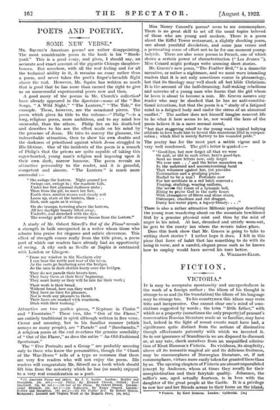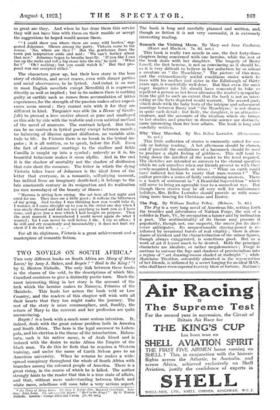IT is easy to overpraise spontaneity and unexpectedness in the
work of a foreign author ; the idiom of his thought is strange to us and (in the translation) the idiom of his language may be strange too. To his countrymen this idiom may seem trite and inexpressive. One cannot clear one's mind of asso- ciations suggested by words ; the term " little father," with which as a property (sometimes the only property) of peasant's conversation Russian literature made us so familiar, may have had, indeed in the light of recent events must have had, a significance quite distinct from the notions of diminutive though affectionate paternity with which we invested it. So in our ignorance of Scandinavia we are disposed to discount or, at any rate, check ourselves from an unqualified admira- tion of Knut Ilamsun's Victoria. Its vividness, its simplicity, above all its romantic magical air and its delicious freshness, may be commonplaces of Norwegian literature, or, if not commonplaces, virtues more easily taken for granted there than by us. The opening chapters of Victoria are almostunparalleled (except by Andersen, whom at times they recall) for their unsophistication and their fairytale quality. Johannes, the miller's son, aged actually fourteen, is in love with the daughter of the great people at the Castle. it is a privilege to row her and her friends across to their home on the island, • Victoria. By Knut liamsun. London: Gyldendal, De.)
so great are they. And when he has done them this service they will not have him with them on their ramble or accept the suggestions he hoped would amuse them.
" ' I could show you where there are some wild berries,' sug- gested Johannes. Silence among the party. Victoria came to the rescue. No, where are they ? ' But the gentleman from the town put temptation aside and said : We can't bother about that now.' Johannes began to breathe heavily. ' If you like I can
run up the rocks and roll a big stone into the sea,' he said. What for f " Oh I nothing ; but you could watch it.' But that pro- posal was not accepted either."
The characters grow up, but their love story is the love story of children, and never ceases, even with dinner parties
and social observances, to be lyrical. And (what is so rare in most English novelists except Meredith) it is expressed
directly as well as implied ; but in its sadness there is nothing guilty or earthly such. as comes from accumulation of bitter experiences, for the strength of the passion makes other experi- ences seem unreal ; they cannot mix with it for they are different in kind. Turgeniev was able (in a House of Gentle- folk) to present a love motive almost as pure and unalloyed as this side by side with the realistic and even satirical method of the novel of manners. The contrast helped. But there can be no contrast in lyrical poetry except between moods ; no balancing of illusion against disillusion, no variable atti- tude to life. In Victoria there is no break in the lyrical im- pulse ; it is all written, so to speak, before the Fall. Even the fact of Johannes' marriage to the shallow and fie-1de Camilla is caught up into a symbol ; unlovely as it is, his beautiful behaviour makes it seem idyllic. And in the end it is the shadow of mortality not the shadow of disillusion that cuts short the romance. The letter in which the dying
Victoria takes leave of Johannes is the ideal form of the letter that everyone, in a romantic, self-pitying moment, has indited from an imaginary death-bed ; it belongs to the late nineteenth century in its resignation and its realization (so rare nowadays) of the beauty of illness :
" Mamma is sitting here crying. She sat here all last night and cried for me. That does me a little good : it softens the bitterness of my going. And to-day I was thinking how you would take it, I wonder, it I came straight up to you in the street one day when I was nicely dressed and did not say anything to hurt you as I have done, and gave you a rose which I had bought on purpose. Then the next moment I remembered I could never again do what I wanted ; for I can never be well before I die. I cry so often ; I lie still and cry ceaselessly and inconsolably ; it does not hurt my chest if I do not sob. . . ."
For all its slightness, Victoria is a great achievement and a masterpiece of romantic fiction.



































 Previous page
Previous page